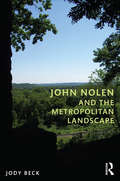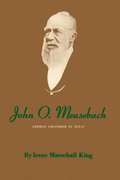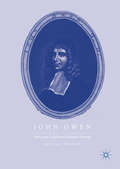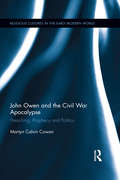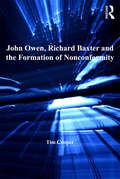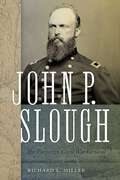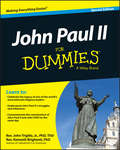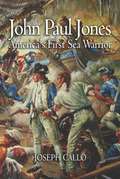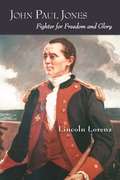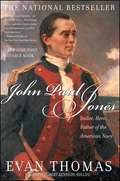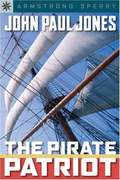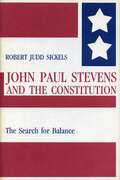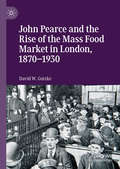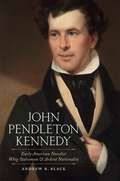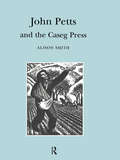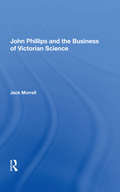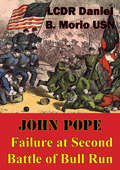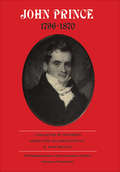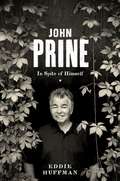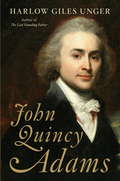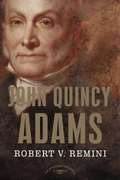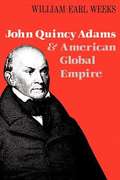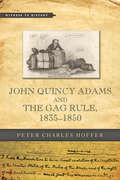- Table View
- List View
John Nolen and the Metropolitan Landscape
by Jody Beck"A model city, the hope of democracy" – John Nolen on his suggested plans for Madison, Wisconsin This book connects John Nolen's political and social visions with his design proposals by analyzing his extensive writings, personal correspondence and some of his most significant works. While John Nolen is best known as a city planner, he trained as a landscape architect and used the titles 'landscape architect' and 'city planner' interchangeably throughout his career. A prolific practitioner, he was engaged in nearly 400 projects throughout the United States between 1905 and 1936, including town planning, industrial housing, state and city parks, new towns and regional planning. Focusing particularly on several projects central to Nolen’s career including Madison (WI), Mariemont (OH), Venice (FL) and Penderlea (NC), Beck investigates the ideologies that underpinned Nolen’s work. This is a rare look at a key figure in the development of 20th century American cities.
John O. Meusebach: German Colonizer in Texas
by Irene Marschall KingOtfried Hans Freiherr von Meusebach chose a life of hardship and freedom in Texas rather than a life of comfort and influence in his native Germany, where he had lived his formative years within a framework of unconstitutional government. In 1845 the young liberal relinquished his hereditary German title, left behind his close family ties and his various intellectual and political associations, and arrived in Texas as John O. Meusebach, commissioner-general for the Society for the Protection of German Immigrants. His background enabled him to assume an enlightened leadership of fellow immigrants who were pouring in from Germany. Lacking adequate financial backing, he nevertheless led the settling of some five thousand people in a land that was largely occupied by Indians. Irene Marschall King presents the full sweep of Meusebach's vigorous life: Meusebach as the young liberal in Germany, as the colonizer in the 1840s, as a Texas senator and, later, an observer of the Civil War, and as a Texan who devoted his later years to bringing the Texas soil to fruition-all set against a background of the immigration movement and frontier life. "Freedom is not free; it is costly," Meusebach believed. In Texas he found for himself and others freedom worth the price he paid. Rich in historic detail, King's story recounts the founding of Fredericksburg, the crippling effect of the Mexican War upon the mass of immigrants huddled in illness on the coast, the signing of the Indian Treaty, which opened to settlement over three million acres of land, and the final collapse of the Society for the Protection of German Immigrants. Also depicted is the colonists' influence on the land-the gardens and orchards of south central Texas, the "Easter Fires" that blaze on the hills surrounding Fredericksburg, the mixture of German custom with American necessity that created a unique culture. Throughout the narrative Mrs. King presents a fascinating cast of characters: the noble Prince Solms, who tries to establish a German military outpost in Texas; Henry Fisher, who attempts by devious methods to control the colonists and their land and finally incites a mob which tries to hang Meusebach; Philip Cappes, a special commissioner and Meusebach's assistant, who plots through intriguing correspondence with Count Castell, the executive secretary in Germany, to overthrow Meusebach; and the colorful and courageous Indian fighter and Texas Ranger, Colonel Jack Hays. Primarily, however, this is the story of a man who found strength in his family's motto, "Perseverance in Purpose," and gave of his energies to build Texas.
John Owen
by Ryan M. Mcgraw"The Foundation of Communion with God" introduces readers to the Trinitarian piety of John Owen (1616-1683).
John Owen and the Civil War Apocalypse: Preaching, Prophecy and Politics (Religious Cultures in the Early Modern World)
by Martyn Calvin CowanJohn Owen was one of the most significant figures in Reformed Orthodox theology during the Seventeenth Century, exerting considerable religious and political influence in the context of the British Civil War and Interregnum. Using Owen’s sermons from this period as a window into the mind of a self-proclaimed prophet, this book studies how his apocalyptic interpretation of contemporary events led to him making public calls for radical political and cultural change. Owen believed he was ministering at a unique moment in history, and so the historical context in which he writes must be equally considered alongside the theological lineage that he draws upon. Combining these elements, this book allows for a more nuanced interpretation of Owen’s ministry that encompasses his lofty spiritual thought as well as his passionate concerns with more corporeal events. This book represents part of a new historical turn in Owen Studies and will be of significant interest to scholars of theological history as well as Early Modern historians.
John Owen, Richard Baxter and the Formation of Nonconformity
by Tim CooperJohn Owen (1616-1683) and Richard Baxter (1615-1691) were both pivotal figures in shaping the nonconformist landscape of Restoration England. Yet despite having much in common, they found themselves taking opposite sides in several important debates, and their relationship was marked by acute strain and mutual dislike. By comparing and contrasting the parallel careers of these two men, this book not only distils the essence of their differing theology, it also offers a broader understanding of the formation of English nonconformity. Placing these two figures in the context of earlier events, experience and differences, it argues that Restoration nonconformity was hampered by their strained personal relationship, which had its roots in their contrasting experiences of the English Civil War. This study thus contributes to historiography that explores the continuities across seventeenth-century England, rather than seeing a divide at 1660. It illustrates the way in which personality and experience shaped the development of wider movements.
John P. Slough: The Forgotten Civil War General
by Richard L. MillerJohn Potts Slough, the Union commander at the Battle of Glorieta Pass, lived a life of relentless pursuit for success that entangled him in the turbulent events of mid-nineteenth-century America. As a politician, Slough fought abolitionists in the Ohio legislature and during Kansas Territory&’s fourth and final constitutional convention. He organized the 1st Colorado Volunteer Infantry after the Civil War broke out, eventually leading his men against Confederate forces at the pivotal engagement at Glorieta Pass. After the war, as chief justice of the New Mexico Territorial Supreme Court, he struggled to reform corrupt courts amid the territory&’s corrosive Reconstruction politics.Slough was known to possess a volcanic temper and an easily wounded pride. These traits not only undermined a promising career but ultimately led to his death at the hands of an aggrieved political enemy who gunned him down in a Santa Fe saloon. Recounting Slough&’s timeless story of rise and fall during America&’s most tumultuous decades, historian Richard L. Miller brings to life this extraordinary figure.
John Paizs's Crime Wave
by Jonathan BallJohn Paizs's 'Crime Wave' examines the Winnipeg filmmaker's 1985 cult film as an important example of early postmodern cinema and as a significant precursor to subsequent postmodern blockbusters, including the much later Hollywood film Adaptation. Crime Wave's comic plot is simple: aspiring screenwriter Steven Penny, played by Paizs, finds himself able to write only the beginnings and endings of his scripts, but never (as he puts it) "the stuff in-between." Penny is the classic writer suffering from writer's block, but the viewer sees him as the (anti)hero in a film told through stylistic parody of 1940s and 50s B-movies, TV sitcoms, and educational films.In John Paizs's 'Crime Wave,' writer and filmmaker Jonathan Ball offers the first book-length study of this curious Canadian film, which self-consciously establishes itself simultaneously as following, but standing apart from, American cinematic and television conventions. Paizs's own story mirrors that of Steven Penny: both find themselves at once drawn to American culture and wanting to subvert its dominance. Exploring Paizs's postmodern aesthetic and his use of pastiche as a cinematic technique, Ball establishes Crime Wave as an overlooked but important cult classic.
John Paul II For Dummies, Special Edition
by Rev John Trigilio Jr. Rev Kenneth Brighenti Rev Monsignor James Cafone Rev Jonathan ToborowskyFind out how two extraordinary leaders changed religion and the worldIn April 2014, Pope Francis will jointly canonize two predecessors, John Paul II and John XXIII, in a move that recognizes the extraordinary accomplishments of these leaders of the Catholic faith. An estimated 1 million people filled St. Peter's Square and the surrounding streets for John Paul II's beatification, and the joint canonization will attract even more. With John Paul II For Dummies, Special Edition you can learn more about these admired religious leaders and join millions of devotees in celebrating their lives and legacies. You'll get an in-depth look at John Paul II's remarkable life and achievements and learn more about the beloved John XXIII in a bonus chapter. With this special edition e-book written in friendly, plain English, you'll discover how John Paul II's deep religious convictions affected world politics, history, and the Catholic faith. You'll be introduced to his influences, his personal struggles, the way he impacted the Church, and his methods for spreading his powerful message. Catholics and non-Catholics alike will find the stories of these holy men fascinating and inspiring. Introduces you to the lives and legacies of both John Paul II and John XXIIIPresents you with the struggles, influences, and approaches to world politics of John Paul II, whose actions had a great impact on historyIncludes a bonus chapter that details the life of John XXIII, who will be canonized along with John Paul II in April 2014Written in an engaging, accessible style and a great read for Catholics and non-Catholics alikeJohn Paul II For Dummies, Special Edition is your guide to discovering the exemplary lives of two rare and extraordinary men who have influenced generations of people all over the world.
John Paul Jones
by Joseph CalloThis fresh look at America's first sea warrior avoids the hero worship of past biographies and provides a more complete understanding of his accomplishments. Writing from the perspective of a naval officer with more than thirty years of experience and a seaman with a lifetime of sailing know-how, Callo examines Jones' extraordinary career by going beyond his legendary naval achievements to establish him as a key player in the American Revolution. Analyzing his relationships with important civilian leaders of the Revolution, such as Benjamin Franklin, the author demonstrates how Jones' handling of those often difficult dealings contributed to the nation's concept of civilian control of the military. In this acclaimed biography, Jones is shown to be not only a highly-skilled and relentless commander, but the first serving American naval officer to emphasize the role the Navy could play in the rise of the United States as a global power.
John Paul Jones
by Lincoln LorenzThis is the true life story of the Scottish gardener's son, John Paul, who became America's greatest naval hero, John Paul Jones. British midshipman, African slaver, traveling actor, merchant captain, accused of murder and suspected of freebooting-this was John Paul. Captain in Washington's Continental Navy, raider of the British coasts and victor in one of history's most desperate naval battles, lion of the French court and beloved by beautiful women, Russian admiral under Catherine the Great, and dead at 45, neglected by his adopted United States, his very grave lost for a hundred years-that was John Paul Jones.
John Paul Jones: Sailor, Hero, Father of the American Navy
by Evan ThomasRelive the American Revolution in this gripping biography of sailor John Paul Jones, remembered as the father of the American Navy.
John Paul Jones: The Pirate Patriot
by Armstrong SperryNewbery Medalist Armstrong Sperry tells the exciting story of the man who led a rag-tag continental navy to victory at sea.
John Paul Stevens and the Constitution: The Search for Balance
by Robert SickelsA good pragmatist's constitutional theory is inseparable from the legal disputes out of which it arises. John Paul Stevens's theory, that of deciding individual cases well instead of applying constitutional principles in the abstract to cases by category, thus lends itself to being studied in its natural, factual habitat—in his own words, case by case. That's what this book does. In Chapter 1 Sickels distills Stevens's thoughts about law and appellate judging from his early writings and his opinions on the federal appeals court and, from 1975 to the present, on the U.S. Supreme Court. Stevens shows a concern for facts and consequences, for balancing, for deference to other decision makers unless they have been careless, for avoidance of undue complexity in judge-made law, and for drawing the line between clarity and oversimplification in legal rules. The next three chapters describe the application of Stevens's pragmatism to areas of constitutional law to which the Court and he especially have devoted most attention in recent years: First Amendment guarantees of freedom of expression and religion, the procedural guarantees (broadly, due process) of the Bill of Rights and the Fourteenth Amendment, and the equal protection of the laws. In each area, Stevens's special contributions are described. The concluding chapter places Stevens's judging in the contexts of the ongoing debate about the legitimacy of balancing, the ways of other moderates on the Court, and the voting records of the other members of the Court as a whole.Unique to this work is a meaningful introduction to the term moderate when applied to a Supreme Court justice, a definition based on careful analysis of the interplay of general rules and specific, case-by-case context. As such it is the very essence of Stevens's own way of judging and thus enables analysis of the work of a pragmatist on his own terms rather than through the distortions of a conflicting theory of law. John Paul Stevens is recognized as a jurist of unusual ability and one adheres to no ideological camp. While it is one thing to know he is neither rigid liberal nor a conservative, this book goes beyond the "neither nor" to accomplish the more difficult goal of defining what he is.This study is intended for scholars and students of the Supreme Court, the Constitution, the courts, and the American political process. Lawyers working before the Supreme Court, informed generalists, and courtwatchers generally, whether liberal, conservative, or neutral, will find much of interest here.
John Pearce and the Rise of the Mass Food Market in London, 1870–1930
by David W. GutzkeAt the center of sweeping change to food retailing practices in Victorian and Edwardian England lies one man: John Pearce. An innovative businessman and a quintessential rags-to-riches success story, Pearce was at the forefront of the rise of the mass food market in London. With his catering company Pearce & Plenty, he fed millions of workers who wanted fast, nutritious, and tasty food. David W. Gutzke mines a wide range of primary sources to offer a portrait of a pivotal figure in London and a leader of the temperance catering movement who had “done more than can be readily recognised to render London a sober city.” By studying Pearce’s companies as well as those of his competitors, this book documents a half century of changing consumption habits in London.
John Pendleton Kennedy: Early American Novelist, Whig Statesman, and Ardent Nationalist (Southern Biography Series)
by Andrew R. BlackJohn Pendleton Kennedy (1795--1870) achieved a multidimensional career as a successful novelist, historian, and politician. He published widely and represented his district in the Maryland legislature before being elected to Congress several times and serving as secretary of the navy during the Fillmore administration. He devoted much of his life to the American Whig party and campaigned zealously for Henry Clay during his multiple runs for president. His friends in literary circles included Charles Dickens, Washington Irving and Edgar Allan Poe. According to biographer Andrew Black, scholars from various fields have never completely captured this broadly talented antebellum figure, with literary critics ignoring Kennedy's political work, historians overlooking his literary achievements, and neither exploring their close interrelationship. In fact, Black argues, literature and politics were inseparable for Kennedy, as his literary productions were infused with the principles and beliefs that coalesced into the Whig party in the 1830s and led to its victory over Jacksonian Democrats the following decade. Black's comprehensive biography amends this fractured scholarship, employing Kennedy's published work and other writing to investigate the culture of the Whig party itself.Using Kennedy's best-known novel, the enigmatic Swallow Barn, or, A Sojourn in the Old Dominion (1832), Black illustrates how the author grappled unsuccessfully with race and slavery. The novel's unstable narrative and dissonant content reflect the fatal indecisiveness both of its author and his party in dealing with these volatile issues. Black further argues that it was precisely this failure that caused the political collapse of the Whigs and paved the way for the Civil War.
John Petts and the Caseg Press (Routledge Revivals)
by Alison SmithThis title was first published in 2000: John Petts (1914-1991) is one of the outstanding wood-engravers of the twentieth century. His stunning prints featuring Welsh mountains and the people who live amongst them reflect his deep concern for the history of the land and are distinguished by his profound understanding of the physical and psychological properties of light. Extensively illustrated, John Petts and the Caseg Press spans the entire career of this reclusive artist and offers the first account of the private press he founded in Snowdonia in 1937. In 1935, John Petts and Brenda Chamberlain abandoned their studentships at the Royal Academy Schools, London for a rundown farmhouse in the rugged terrain of Snowdonia. They started the Caseg Press in 1937 in the hope that it might finance their freedom to work. At first dedicated to saleable ephemera such as Christmas cards and bookplates, the press later became involved in the broader Welsh cultural scene, providing illustrations for the Welsh Review, a monthly literary periodical. In 1941, with the writer Alun Lewis, the Caseg press produced a series of broadsheets designed to express continuity and identification with the life of rural Wales in the face of social change precipitated by the second world war. John Petts and the Caseg Press is the first monograph on this artist. It covers both his work for the Caseg Press and for other publishers such as the Golden Cockerel Press. The volume offers a unique insight into an important chapter in the history of private presses in Britain and the development of neo-romanticism in art and literature during the inter-war period.
John Phillips and the Business of Victorian Science: The Fiction Of The Brotherhood Of The Rosy Cross (Routledge Revivals Ser.)
by Jack MorrellJohn Phillips was one of the most remarkable and important scientists of the Victorian period. Orphaned at the age of seven and brought up by his uncle, he rose to hold a number of highly prestigious posts within the British academic and scientific community, despite lacking a university education. By the time of his death in 1874 he was widely regarded as one of the pioneers and champions of the science of geology, yet until now there has been no full length biography of Phillips. In rectifying this lacuna, Jack Morrell has produced a meticulous and magisterial piece of scholarship that does justice to the achievements and legacy of John Phillips. Adopting a broadly chronological approach, the book not only traces the development of Phillips's career but clarifies and highlights his role within Victorian culture, shedding light on many wider themes. It explores how Phillips' love of science was inseparable from his need to earn a living and develop a career which could sustain him. Hence questions of power, authority, reputation and patronage were central to Phillips's career and scientific work. Drawing on a wealth of primary sources and a rich body of recent writings on Victorian science, this biography provides a fascinating and compelling account of John Phillips and his legacy. Pulling together his personal story with the scientific theories and developments of the day, and fixing them firmly within the context of wider society, this biography will be vital reading for anyone with an interest in the history of British and nineteenth-century science.
John Pope - Failure At Second Battle Of Bull Run
by LCDR Daniel B. Morio USNWas the failure of the Army of Virginia at the Second Battle of Bull Run a result of General John Pope being a failure as a leader or were there other circumstances that helped him in his loss?General Pope had a long career in the Army that to the Second Battle of Bull Run had gone well. Pope had distinguished himself in the Mexican-American War and had done well early on in the western theater of operations during the Civil War. With his assumption of command in northern Virginia, Pope entered a realm in which he was unfamiliar, not welcomed by the troops he led and out of his league with regards to the Confederate leaders arrayed against him.Pope's paranoia regarding commanders who had come from General George McClellan's Army of the Potomac resulted in a lack of trust in first-hand accounts from senior officers as well as intelligence presented. This lack of trust resulted in his disregarding the fact that General Lee and Longstreet had moved 25,000 Confederate soldiers through Thoroughfare Gap and combined forces with General Jackson and deployed them along the right flank of Jackson's forces and perpendicular to Pope's force. This force than proceeded to assail the Union flank to nearly disastrous proportions.The fog of war has clouded the judgment of many generals throughout history and Pope was no exception. The fog of war negatively affected his imagination and ability to think critically throughout the battle.
John Prince 1796-1870: A Collection of Documents
by R. Alan DouglasJohn Prince was a lawyer, farmer, military officer, politician, judge, and entrepreneur. Born at Hereford, England, in 1796, he emigrated to Upper Canada in 1833 because he was ashamed of his ne'er-do-well father. His interest in farming took him to Sandwich where he became involved in the many careers open to him. An unhappy and volatile man, he was constantly at odds with himself, his family, and his associates. As colonel of the Third Essex Regiment, he was sometimes unpredictable in his actions and on one occasion, during the Upper Canada Rebellion, unjustifiably violent – ordering the summary execution of five prisoners after the Battle of Windsor. As a politician, despite his haughty and melancholic nature and his erratic individualism, he held the loyalty of his constituents, representing Essex in the House of Assembly from 1836 to 1854 and the Western Districts in the Legislative Council from 1856 to 1860. In 1860, after a lifetime spent in politics, farming, railroading and mining speculations, and canal schemes, he obtained a long-sought judgeship in the new District of Algoma. Leaving his wife and children behind, he went off to his 'New Siberia,' where he continued his restless struggle to escape 'the importunities of mankind,' and where his long, tragic life ended in 1870. Entries from Prince's diary, excerpts from newspaper accounts, and letters give a vivid picture of the politics and life of his time. In his Introduction, R. Alan Douglas emphasizes the contribution made by the discovery of the diary to our perception of the people, places, and events of mid-nineteenth century North America. (Ontario Series of the Champlain Society, 11)
John Prine: In Spite of Himself
by Eddie HuffmanWith a range that spans the lyrical, heartfelt songs "Angel from Montgomery," "Sam Stone," and "Paradise" to the classic country music parody "You Never Even Called Me by My Name," John Prine is a songwriter's songwriter. Across five decades, Prine has created critically acclaimed albums--John Prine (one of Rolling Stone's 500 Greatest Albums of All Time), Bruised Orange, and The Missing Years--and earned many honors, including two Grammy Awards, a Lifetime Achievement Award for Songwriting from the Americana Music Association, and induction into the Nashville Songwriters Hall of Fame. His songs have been covered by scores of artists, from Johnny Cash and Miranda Lambert to Bette Midler and 10,000 Maniacs, and have influenced everyone from Roger McGuinn to Kacey Musgraves. Hailed in his early years as the "new Dylan," Prine still counts Bob Dylan among his most enthusiastic fans. In John Prine, Eddie Huffman traces the long arc of Prine's musical career, beginning with his early, seemingly effortless successes, which led paradoxically not to stardom but to a rich and varied career writing songs that other people have made famous. He recounts the stories, many of them humorous, behind Prine's best-known songs and discusses all of Prine's albums as he explores the brilliant records and the ill-advised side trips, the underappreciated gems and the hard-earned comebacks that led Prine to found his own successful record label, Oh Boy Records. This thorough, entertaining treatment gives John Prine his due as one of the most influential songwriters of his generation.
John Quincy Adams
by Harlow UngerHe fought for Washington, served with Lincoln, witnessed Bunker Hill, and sounded the clarion against slavery on the eve of the Civil War. He negotiated an end to the War of 1812, engineered the annexation of Florida, and won the Supreme Court decision that freed the African captives of "The Amistad. " He served his nation as minister to six countries, secretary of state, senator, congressman, and president. John Quincy Adams was all of these things and more. In this masterful biography, award winning author Harlow Giles Unger reveals Quincy Adams as a towering figure in the nationOCOs formative years and one of the most courageous figures in American history, which is why he ranked first in John F. KennedyOCOs Pulitzer Prizeuwinning "Profiles in Courage. " A magisterial biography and a sweeping panorama of American history from the Washington to Lincoln eras, UngerOCOs "John Quincy Adams" follows one of AmericaOCOs most important yet least-known figures.
John Quincy Adams (The American Presidents Series)
by Arthur M. Schlesinger Robert V. ReminiA vivid portrait of a man whose pre- and post-presidential careers overshadowed his presidency. Chosen by the House of Representatives after an inconclusive election against Andrew Jackson, John Quincy Adams often failed to mesh with the ethos of his era, pushing unsuccessfully for a strong, consolidated national government. Historian Robert V. Remini recounts how in the years before his presidency Adams was a shrewd, influential diplomat, and later, as a dynamic secretary of state under President James Monroe, he solidified many basic aspects of American foreign policy, including the Monroe Doctrine. Undoubtedly his greatest triumph was the negotiation of the Transcontinental Treaty, through which Spain acknowledged Florida to be part of the United States. After his term in office, he earned the nickname "Old Man Eloquent" for his passionate antislavery speeches.
John Quincy Adams and American Global Empire
by William Earl WeeksThis is a story about a man, a treaty, and a nation. The man is John Quincy Adams: son of a president, congressman, president and the greatest secretary of state in American history.
John Quincy Adams and the Gag Rule, 1835–1850 (Witness to History)
by Peter Charles HofferExamining the congressional debates on antislavery petitions before the Civil War.Passed by the House of Representatives at the start of the 1836 session, the gag rule rejected all petitions against slavery, effectively forbidding Congress from addressing the antislavery issue until it was rescinded in late 1844. In the Senate, a similar rule lasted until 1850. Strongly supported by all southern and some northern Democratic congressmen, the gag rule became a proxy defense of slavery’s morality and economic value in the face of growing pro-abolition sentiment. In John Quincy Adams and the Gag Rule, 1835–1850, Peter Charles Hoffer transports readers to Washington, DC, in the period before the Civil War to contextualize the heated debates surrounding the rule. At first, Hoffer explains, only a few members of Congress objected to the rule. These antislavery representatives argued strongly for the reception and reading of incoming abolitionist petitions. When they encountered an almost uniformly hostile audience, however, John Quincy Adams took a different tack. He saw the effort to gag the petitioners as a violation of their constitutional rights. Adams’s campaign to lift the gag rule, joined each year by more and more northern members of Congress, revealed how the slavery issue promoted a virulent sectionalism and ultimately played a part in southern secession and the Civil War. A lively narrative intended for history classrooms and anyone interested in abolitionism, slavery, Congress, and the coming of the Civil War, John Quincy Adams and the Gag Rule, 1835–1850, vividly portrays the importance of the political machinations and debates that colored the age.
